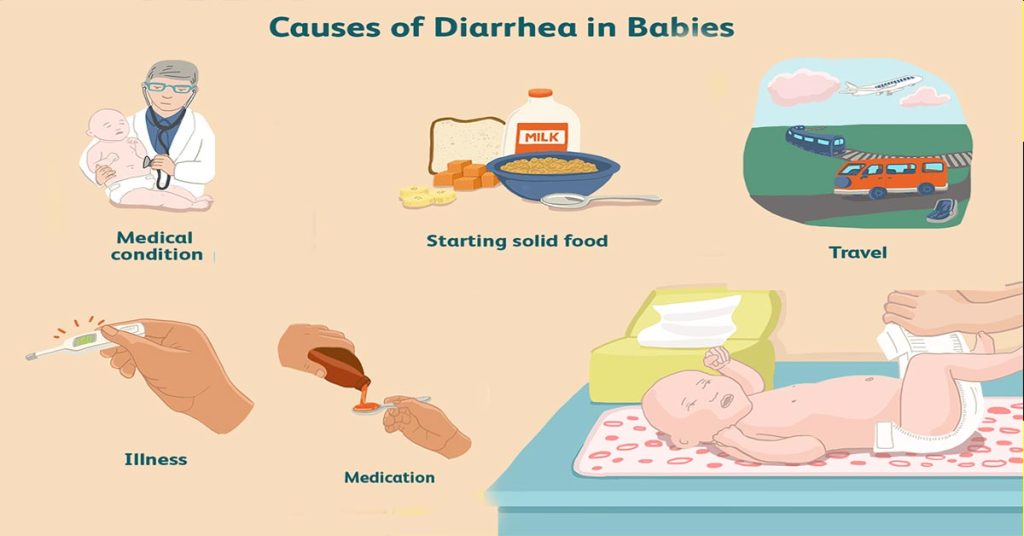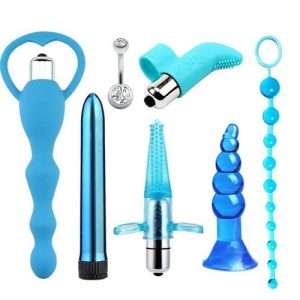
Diarrhea in babies, also called dysentery, gastroenteritis, stomach flu, runs, or trots is the sudden increase in the frequency of poo, and changes in the texture, color, and smell of the poop.
Diarrhea in babies can be greenish, yellowish, reddish, whitish, or no changes in color, but usually, it smells worse, has mucus, and can also have other symptoms like fever and vomiting.
What Causes Diarrhea (Dysentry) in Babies?
Diarrhea or dysentery in babies can have many causes, including allergy, teething, bacterial, fungal, and viral infections.
Bacterial or viral diarrhea in babies can take a long time before it stops and usually require medical attention.
Some of the causes of diarrhea in babies are the following.
Thrush
Thrush is a yeast infection that the baby can get from the mother during breastfeeding on bottle-feeding.
Dangerous fungal spores develop very quickly in milk bottles or on nipples that have not been cleaned carefully enough.
It first affects the oral cavity and then gets into the baby’s gastrointestinal tract.
Small, white spots form in the mouth of the baby or toddler, and they cannot be wiped out.
You shouldn’t try that either, because it will spread the infection even more.
Thrush is painful for babies and they no longer want to drink properly. The doctor will treat the thrush infection with fungicides.
The thrush can be prevented through careful hygiene of the bottles and the mother’s body.
Other Infections and Worms Diseases
Bacterial and viral infections can also cause diarrhea, especially in toddlers since they’re more active and can interact with dirty things more.
Again, only the doctor can determine what type of disease it is and will treat it accordingly.
Many vaccinations far outweigh their risks and side effects. Also, worm infestations can cause trots.
Allergies and Teething
Allergies and Teething are common causes of diarrhea in babies that are over 1 year.
Most babies that are already eating solid foods can’t stand the joy of eating a new food or drink.
Milk intolerance or food allergy can also cause diarrhea in babies, and here too, it is important to consult your doctor.
Teething in another way is a classic cause of runs in most babies since excess acids are released in the body during this process.
Some babies get diarrhea every time a tooth erupts. Here it is particularly important to apply a lot of protective creams and to change the diaper immediately after each bowel movement.
Otherwise, the sensitive baby’s skin will immediately become red and sore. Little girls in particular are extremely sensitive to teething.
Drinks
It is important to ensure that children always drink enough water.
Sugary teas and juices and the constant sucking on bottles and pacifiers not only damage the teeth massively but also change the environment of the intestinal flora.
If you pay attention to all of this, you can prevent many diseases, and not just diarrhea alone.
How to Stop Diarrhea in Babies?
When your baby develops diarrhea, you should never hesitate long before you take your baby to the clinic or the pediatrician.
Only your doctor can determine what kind of illness is behind diarrhea, since diarrhea and, fever or vomiting can be symptoms of other illnesses.
However, diarrhea in babies can be managed at home by doing the following.
- Make sure your baby takes a lot of fluid to prevent dehydration and tiredness.
- You should also give oral rehydration solution (ORS) to prevent weight loss
- Clean his feeders and drinkers properly
- Maintain proper personal hygiene and environmental hygiene
- Continue to breastfeed your baby or change to bottle feeding or vice versa just whichever one the baby is pleased with at that period.
- Cereals, flour-made foods, and fruits can also be given to babies that are already eating solid foods.
- Reduce high-sugar foods, and reverse solid foods your baby takes before diarrhea.





